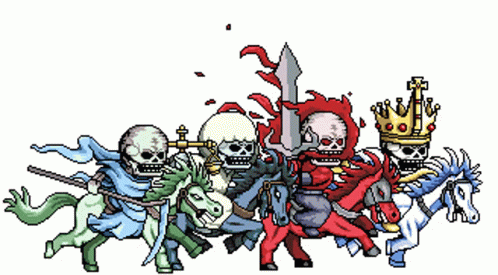The four horseman of the apocalypse

The four horseman of the apocalypse, who they are ,and there metaphysical and spiritual significance 1. Introduction: The Four Horsemen of the Apocalypse The concept of the Four Horsemen of the Apocalypse has captured the imaginations of people throughout history. Found in the Book of Revelation, these enigmatic figures - Conquest, War, Famine, and Death - are symbolic representations of catastrophic events that mark the end of times. Beyond their biblical origins, the Four Horsemen hold deep metaphysical and spiritual significance, offering profound insights into the human experience and the nature of existence. In this article, we will delve into the identities and interpretations of each Horseman, exploring their symbolic meanings and contemplating the profound spiritual lessons they impart. By unraveling the mysteries surrounding the Four Horsemen, we can gain a greater understanding of the eternal struggle between light and darkness and the transformative power of these metaphysical forces. 1. Introduction: The Four Horsemen of the Apocalypse Ah, the Four Horsemen of the Apocalypse - the ultimate dream team of doom and gloom. They have been the subject of countless theories, speculations, and nightmares throughout history. These four horsemen are featured in the Book of Revelation, bringing destruction and chaos upon the world. But who are they really, and what is their metaphysical and spiritual significance? Buckle up, my friends, because we're about to embark on a wild ride through the realms of apocalypse. 2. The First Horseman: Conquest or Pestilence? Here we have the enigmatic First Horseman, whose ride is often associated with conquest and pestilence. According to the Bible, this dude gallops in on a white horse, armed with a bow, and ready to conquer whatever unfortunate souls cross his path. But not so fast! Some interpretations argue that this horseman represents not conquest, but rather a good old-fashioned plague. A pandemic, if you will. 2.1 The Biblical Description of the First Horseman In the Book of Revelation, the First Horseman is described as a rider on a white horse, holding a bow and wearing a crown. He sets out to conquer and bring about chaos and devastation. But hey, isn't it fascinating how even a horseman of the apocalypse cares about fashion? That crown must be all the rage in the underworld. 2.2 Interpretations of the First Horseman as Conquest For those who interpret the First Horseman as conquest, his arrival symbolizes the conqueror's spirit that plagues humanity. It represents the insatiable desire for power and dominance that can lead to wars, colonization, and general unpleasantness. In short, this horseman is the living embodiment of that one person who takes the office scavenger hunt way too seriously. 2.3 Interpretations of the First Horseman as Pestilence On the other hand, some believe the First Horseman brings a good old-fashioned pandemic to the party. Pestilence, disease, and other health crises become his loyal companions. This interpretation hits a little too close to home, doesn't it? It's like someone took the horseman's job description a bit too literally and decided to turn 2020 into their personal conquest. 3. The Second Horseman: War and its Symbolism Next up, we have the Second Horseman, riding in hot on a fiery red horse, representing war. This horseman is like that one friend who always starts a fight at a pub and then vanishes, leaving others to deal with the consequences. Thanks, pal. 3.1 The Biblical Description of the Second Horseman Described as a rider on a red horse and given a great sword, the Second Horseman signifies the arrival of war, conflict, and chaos. He's like the evil twin of Cupid, but instead of spreading love and joy, he spreads destruction and despair. Talk about a mood killer. 3.2 Understanding the Symbolism of War Beyond the literal interpretation, war symbolizes the battles we face within ourselves and the conflicts that arise in our relationships and societies. It highlights the destructive nature of human behavior and the consequences of our inability to find peaceful resolutions. Hey, maybe if the Four Horsemen took up knitting instead, things would turn out a little differently. 3.3 Interpreting the Impact of War on the Metaphysical Realm War doesn't just wreak havoc on the physical realm; it shakes the metaphysical realm as well. The energy of conflict and violence affects the collective consciousness and disrupts the harmony of the universe. It's like throwing a wrench into the gears of the cosmic machinery. So, here's a reminder to choose peace over war, unless it's a water balloon fight. Those are always allowed. 4. The Third Horseman: Famine and its Spiritual Implications Ah, the Third Horseman, the bringer of famine. This horseman's arrival is like the sound of an empty fridge when you're craving a midnight snack - utterly disappointing and not at all convenient. 4.1 The Biblical Description of the Third Horseman In the biblical text, the Third Horseman rides a black horse, holding a pair of scales in his hand. These scales symbolize scarcity and famine, as if someone decided that grocery shopping during a pandemic wasn't stressful enough. Thanks for the reminder, Horseman. 4.2 Symbolism of Famine and its Connection to Spiritual Growth Famine, in its metaphorical sense, represents a scarcity of spiritual nourishment. It captures the emptiness we feel when we disconnect from our purpose, lose touch with our inner selves, or neglect our spiritual growth. It's like trying to live on a diet of microwave popcorn and instant noodles - sure, it fills the belly, but it leaves the soul famished. 4.3 Exploring the Lessons and Challenges of Famine in the Spiritual Journey While famine is undoubtedly challenging, it serves as a reminder to seek the sustenance our souls truly need. It prompts us to look inward and find ways to nourish ourselves spiritually. It pushes us to search for deeper meaning, reconnect with our passions, and embrace practices that bring us closer to our authentic selves. So, next time you find yourself in a spiritual famine, dust off that old meditation cushion and get ready to feast on inner enlightenment. And there you have it, my fearless readers - a whirlwind tour of the Four Horsemen of the Apocalypse. These horsemen may represent some pretty heavy stuff, but hey, at least they give us something to talk about, right? So, keep your sense of humor intact, grab a snack for the road, and remember: even in the face of apocalypse, a little wit and personality can go a long way. Stay fabulous, my friends!5. The Fourth Horseman: And the End of Times The fourth and final horseman of the apocalypse is no joke. This guy brings the big guns, signaling the end of times and all that jazz. But who exactly is this dude, and what's his deal? Let's dive into the biblical description and unravel the mysteries surrounding him. 5.1 The Biblical Description of the Fourth Horseman According to the good book, the fourth horseman rides forth on a pale horse, aptly named Death. He's accompanied by Hades, who, let's be honest, sounds like an absolute blast at parties. Death and Hades tag-team the whole "bringing death and destruction" thing, with one killing people and the other hanging out in the underworld. It's like a twisted buddy cop scenario, but without the laughs. 5.2 Symbolic Interpretations of the Fourth Horseman Now, if you're not into taking things literally, fear not! The fourth horseman has been subject to plenty of symbolic interpretations over the years. Some say he represents pestilence, disease, and all things icky that can wipe out populations faster than you can say "hand sanitizer." Others see him as a symbol of the inevitable end of all things, reminding us that life is fleeting and we should probably stop watching cat videos and start living our best lives. 5.3 Unraveling the Mysteries of the End Times through the Fourth Horseman Ah, the end times. It's a topic that has kept theologians, conspiracy theorists, and people who just can't get enough of Doomsday documentaries up at night. The fourth horseman is often seen as a key player in unraveling these mysteries. Some believe that his arrival signals the beginning of a sequence of catastrophic events that will ultimately lead to the grand finale of planet Earth. Others think it's all just metaphorical mumbo-jumbo and that we should focus on finding the best pizza joint in town instead. Your call, really. 6. Metaphysical Interpretations of the Four Horsemen Now, let's shift gears and dive into the metaphysical realm. Some spiritual enthusiasts have taken the four horsemen and given them a makeover, turning them into metaphors for deeper internal struggles. Instead of being external forces wreaking havoc, they become representations of our own fears, desires, and personal battles. It's like therapy, but with a lot more apocalyptic imagery. 7. Spiritual Significance of the Four Horsemen Beyond their biblical and metaphorical interpretations, the four horsemen hold spiritual significance for many. They serve as reminders of the impermanence of life, urging us to reflect on our own mortality and the choices we make in the limited time we have. They invite us to confront our deepest fears and embrace the inevitable cycles of existence. 8. Conclusion: Understanding the Symbolism of the Four Horsemen So, whether you see the fourth horseman as a harbinger of doom or a metaphorical representation of the human condition, one thing is for sure: they've captured our imagination for centuries. Their symbolism allows us to explore the mysteries of life, death, and everything in between. But hey, let's not get too caught up in all the end-of-the-world stuff. After all, there's still plenty of pizza to be eaten and cat videos to watch. In the end, it's all about finding meaning in the journey, no matter how many horsemen are involved.8. Conclusion: Understanding the Symbolism of the Four Horsemen In conclusion, the Four Horsemen of the Apocalypse serve as potent archetypes that reflect the existential challenges and spiritual journey of humanity. From the First Horseman's conquest and pestilence to the Second Horseman's war and the Third Horseman's famine, and ultimately to the Fourth Horseman's representation of death and the end of times, these symbolic figures provide profound insights into the human condition. By exploring their metaphysical and spiritual significance, we can gain a deeper understanding of the cyclical nature of existence, the importance of spiritual growth amidst chaos, and the ultimate quest for enlightenment. The Four Horsemen remind us to embrace these transformative forces with courage, resilience, and a steadfast commitment to our own spiritual evolution
